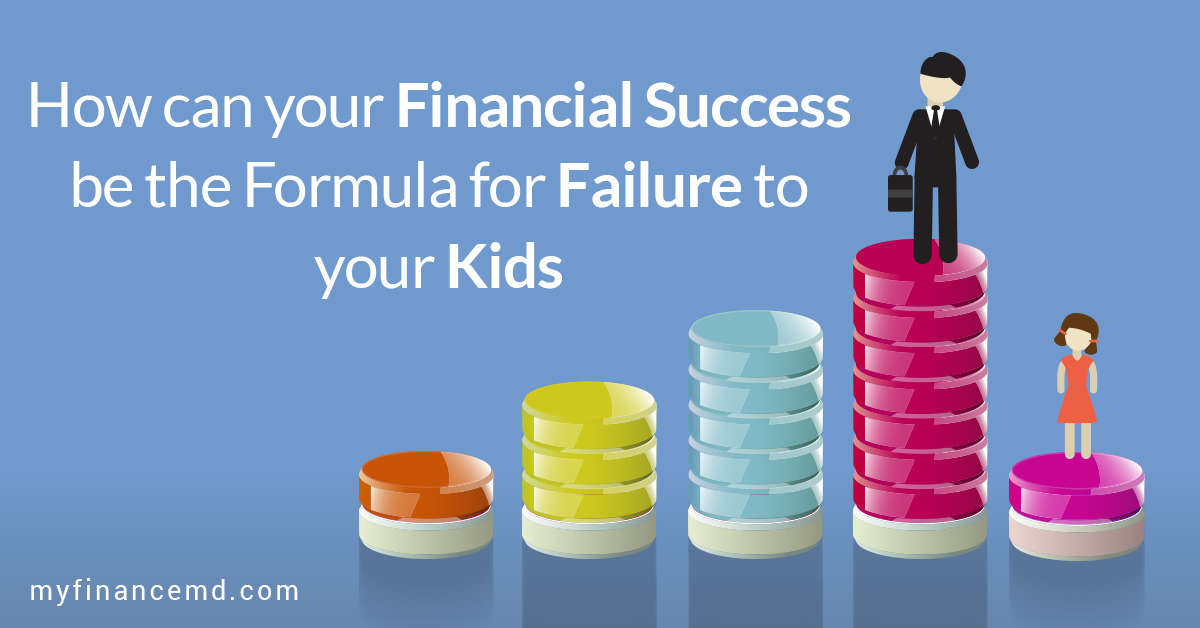How can your Financial Success be the Formula for Failure to your Kids

Celina’s father is a self-made millionaire. Coming from poverty, her father would not want his children to experience the same that he had. Celina and her younger sister were given the most comfortable life anyone could just imagine. They had their personal yayas and sometimes body guards. They had their own cars at such a young age, they had everything they need and don’t need.
One night, when Celina already had a boyfriend, they fought. His jerk boyfriend left her in the streets. Not knowing how to commute, she literally cried and called her friends for help. Her friend had to go to her and fetch her in the middle of the night.
When their father died, they now have to work. Celina, even though she finished college do not know how to work to earn a living, had her emotional breakdown. She realized that, she wished she experienced hardships as her father did.
We often hear success stories from people coming from nowhere, from being nobody to being a somebody. “Rugs to Riches” stories are inspiring so many people when they hear it. People are motivated from these stories, but, it’s not always the same with the children of these successful people.
Your Financial Success could also be the Reason why your kids would be a failure in the future, here’s how and how you can avoid it:
1. You don’t want them to experience the same things you experienced when you were young.
I often hear these stories from parents, “During my time, I will only have too little that I have to walk all the way from our house to our school.”
Today, parents, not wanting their child to experience that, they will give more than the child need. The child will have a school service plus a pretty good allowance to go with it. The parent is thinking, “I don’t want my child to experience what I experienced.”
I am not saying you let your child walk now, but if the path permits, why not? Some kids still have a school service even if the school is just a walking distance away.
The same with household chores.
Assigning a household chore to your child will not kill them. It is teaching them that life is not easy. Even if they have a “yaya” they have to be taught or else you are grooming a spoiled brat. You may even consider not having the “yaya” altogether. Let him fix his own mess, clean his own room.
Lesson: Even if you have the money, don’t make everything easy for them.
2. You exchange money for your absence.
Let’s face it, financial success has to take something from you and often, it is TIME for your family. So, what the parents do, they give expensive gifts or money in exchange of their absence. You don’t have to give those things if you allot “QUALITY TIME” for your family. You don’t need to go to expensive vacation for that. By simply being their playmate, playing with them or taking walks together will be the ones they will surely remember.
I remember a friend telling me, “We don’t have enough when we were children, but, I didn’t notice, because, my father and mother are always there for me.”
Lesson: Your presence will lead to your kids’ success, your absence will lead to their failure.
3. You want to make them as comfortable as possible
You didn’t like the discomfort you felt when you were young. Like riding a jeep, or going to a “smelly palengke.” So, for that, you want that your children will never have to experience riding a commuter bus or a jeepney ever again.
Sometimes if you really can afford to do all that now, why not let your children experience discomfort sometimes? Have them ride a jeepney, let them shop in a smelly wet market.
Lesson: Let them experience life at its very core. It’s really teaching them about Life.
4. You easily pick them up when they fall
This may be literally falling and bruising his knees or falling in other aspects of his life. As a parent, it is so tempting to jump right away to your child if you see him falling on his knees. Sometimes you just need to restrain yourself and let him stand up on his own. You can just be someone on the sides who encourages him to stand up. That is an important lesson that he has to find out from the very beginning. That he may fail again in the future: like falling in class, his first heartbreak or experiencing his first business failure. Just let him know you are there to encourage him, and will help out if extremely needed for your help but he has to get up on his own.
Lesson: Let your child know that he has to stand up from his own mistakes, but you are always there to help if you are really needed.
5. Saying “NO” to Your Kids is Limiting
Experts tell us not to say NO to your kids, because it has a “limiting” effect to your kids in the future. When you constantly say “no” he may realize that maybe he can’t really do it. There is no way possible that he can get it. There are many different ways on how to say “no” without telling them that.
Let me give you an example:
- “I know you like ice cream, but eating too much is not good.“
David Walsh, Ph.D., author of No: Why Kids — Of All Ages — Need to Hear It and Ways Parents Can Say It, suggests that parents deny certain junk food requests, like ice cream and candy, by offering a healthier alternative, such as yogurt.
- If you catch your kid ripping apart a favorite flower or pulling a family pet’s tail, point out that plants and animals are alive too. “When you hurt the flower (or pet), you hurt its feelings and growth.” This helps your child develop empathy and awareness of the feelings of other living beings.
Lesson: There are a lot of creative ways how to say “NO” without saying the word. Be creative.
6. Always saying “YES” is bad for your kids too.
In an article, “What Really Happens When We Give Kids Everything They Want” says that when we always say “YES” to our kids, they become an adult faster and they lose their childhood faster.
When they say, “I want that, because everyone else has that” and you give in. You are fast, losing your child and their childhood. You may have a toddler carrying around his own iPhone or a seven year old wearing clothes and makeup that make her older than she really is.
If you can afford it, it is difficult not to say yes, but early on, you have to set boundaries or else they will grow up with the sense of “entitlement” that they think everybody else should give to them.
Lesson: Set the boundaries, even if you can afford it, let them work for it if they really want it.
Help them set a goal (what they want) and help them to compute on how they can get it. That may mean letting them help you out with something so you can pay them extra. Or that could mean, letting them think of a simple business where they can earn from to add to their savings and closer to their goal. It may be may mean baking cupcakes, they can sell at school.
So, why did you succeed in the first place?
What was your formula?
Do you know what you had before? I will tell you.
You had “Hunger.”
Since you were deprived with things you wanted, since you walked a thousand miles just to get where you are, since you have always been rejected, since you don’t always get what you want, that created a “hunger” within you. Because of that, you did everything you can to succeed and you did, congratulations.
But please remember that you have a different formula to your financial success, and by not letting your children experience the things you did, that also means you are giving them the exact opposite formula that could eventually lead to your kids’ failure in the future.
Maybe it’s time to change the phrase, “I don’t like my children to experience the things I did when I was a child” to “I want them to experience the things I did when I was a child.”
A great friend and a mentor once said to me, “Hunger cannot be taught.” Indeed, it’s true, but I want to add: “Hunger cannot be taught, but it can be recreated with the right experience and guidance from loving parents.” You may not recreate the exact “hunger” you felt, but you are gently guiding them to their own success in the future.
Making you think,

Read more:
- How to Spark Up your Child’s Entrepreneurial Spirit
- 5 Money Habits to Avoid Telling Your Kids
- Money Learning Activities for Kids
- 3 Genius Reasons Behind VUL (Variable Unit Linked) Insurance
- How to get more than 50% discount for your child’s college tuition fee
Latest posts by Pinky De Leon-Intal, MD, RFC (see all)
- Say Goodbye to Chronic Lifestyle Diseases (Hypertension, Diabetes, Cancer, Gout, etc.) with Right Food and Right Water - 23 May, 2023
- Embracing Superpowers: A Mom’s Journey as a Doctor, Professor, and Financial Consultant - 19 May, 2023
- Celebrating the Power of Women: Honored by Philippine Daily Inquirer - 17 May, 2023


This is a timely read especially for all parents with kids. Thanks for sharing.